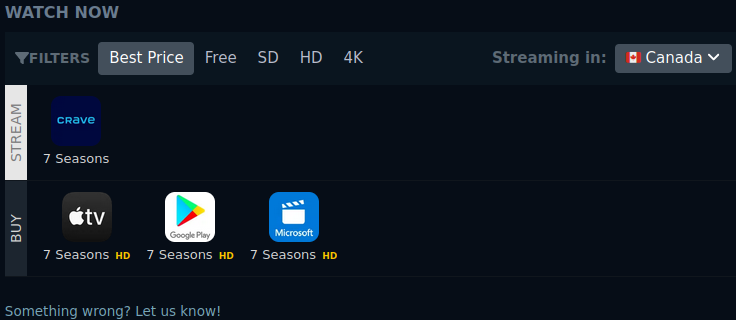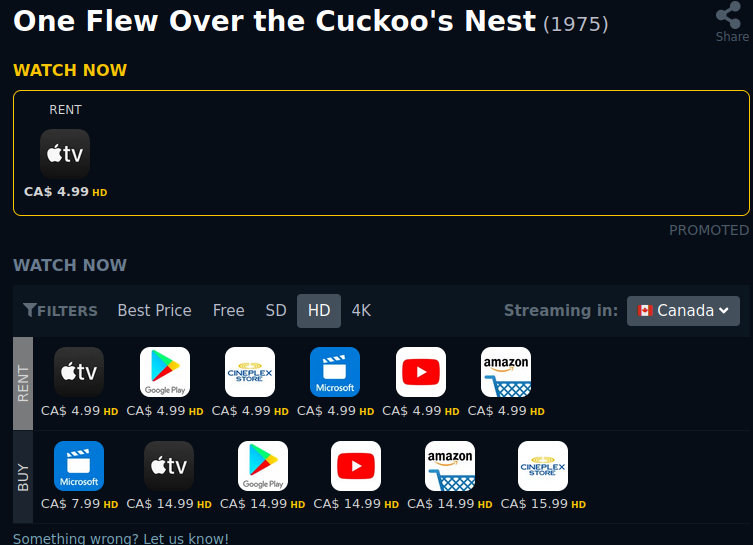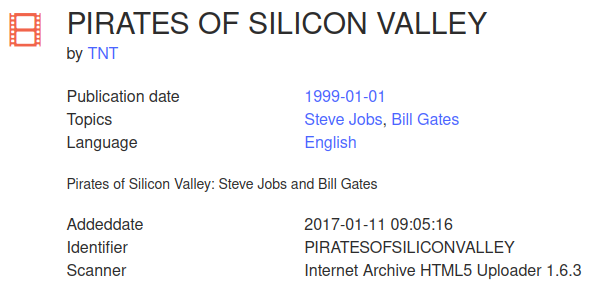
|
It all started with Mythbusters. Last May, we signed up for Discovery Plus and were watching each episode from the beginning. I was happy, damnit: Mythbusters holds a special place in my heart. There’s no way to buy a giant box set of all the episodes and we haven’t had any cable subscription for more than 10 years so I haven’t been able to watch it for a while. I love the show, and even wanted to introduce it to my oldest son.
Then one day, all but a few “specials” episodes disappeared. We were frustrated, and decided to wait for them to come back - I can excuse bugs, and operating a platform for the public is very hard work. We switched to watching Dirty Jobs (another great show!) but that disappeared too. We waited for a few weeks and neither show came back. Eventually, we stopped waiting: it couldn’t have been a bug that had lasted weeks without being addressed. It couldn’t have been a platform problem because other shows worked.
So we cancelled our subscription.
We still couldn’t explain it. Was it an issue of rights? I thought, at the time, that surely, of all companies, Discovery owned the “streaming rights” to Discovery shows? I’ve only recently learned that in October 2022, a company called Banijay started an acquision of Beyond, the company that owned Mythbusters. This is probably what lead to Mythbusters leaving Discovery Plus, but that still doesn’t explain Dirty Jobs.
For me, this isn’t even the first time a show has either moved to another streaming service or disappeared entirely. I mentioned we haven’t had a cable subscription for a long time - that’s because we signed up for Netflix a long time ago, and have (until recently) used that to watch everything.
Netflix used to have Halt and Catch Fire, but now it’s on AMC+. Star Trek: The Next Generation comes and goes, and with Paramount+ a thing now I expect all the Star Trek shows to move there. Parks and Recreation used to be on Netflix, now it’s not (when did that happen?). According to justwatch.com (a site that will tell you where a movie or show is streaming), Parks and Recreation in HD isn’t even available on a streaming service anymore: it must be “bought”:

|
I put quotes around “bought” because a company can remove your right to view the content at any time so I don’t consider it buying, just renting. Or, like UltraViolet, they can simply shut down one day, taking your purchases with it.
I’ve spent some time on justwatch.com trying to find content but I really don’t want to be wasting my time looking up where a movie or show is, potentially signing up to a new service just to watch it, then having to cancel the subscription.
It’s not even niche titles either. Where’s Jurassic Park? For a short time (according to justwatch.com) the only streaming service that had it was Club Illico. The only reason I know that Club Illico exists and is a streaming service is because I tried to find where Jurassic Park was! At the time of this writing, it’s back on Netflix and Prime Video. I have no idea how long that will be true.
What about One Flew Over the Cuckoo’s Nest, one of the best movies of all time? Not available in HD on any streaming service, it must be “rented” or “bought”:

It’s good that’s at least available on something: forget about “niche” titles like Primer, the best movie about time travel you’ll ever watch (guaranteed!):

Everyone’s got a story about movies and shows disappearing, because they are. There are related articles coming out now, like this one called All 130 Movies & TV Shows Leaving Prime Video This Month:
Amazon’s streaming service Prime Video boasts a large selection of movies and TV shows in its library available to subscribers, but much of that content is temporary, with a number of titles leaving each month. Like anything from Amazon, movies and TV shows can become out of stock, even when they’re digital content. However, some of Prime Video’s offerings disappear on a monthly basis on purpose, planned through contracts with film and television distributors. While Amazon produces a lot of original content for Prime Video, the platform licenses most of its movies and shows from other companies, with agreed-upon streaming windows varying in the length of time they’re made available.
Reading this (and other articles like this), it makes sense to me that content is temporary: it’s a economic decision whether or not to pay for the streaming rights, bandwidth to stream, disk space to store the bytes, for each title. At the most basic level, will it bring revenue in for the cost it incurs? Economically, a company cannot have everything, but I know I personally (probably naively) thought that this would eventually be the case. When Netflix came out and took over, we ditched all our physical media at the time: all the TV box sets, movies, everything. This was ok in the early days of Netflix because there was only Netflix, and it felt like everything did end up there. This is no longer true, maybe it never was, and never will be again. Too many companies are in the space now.
Even worse, companies like Disney are getting into the business of licensing content to other platforms instead of streaming it themselves. Maybe this will actually increase availability, because Disney (for example) will want to license content to as many providers as possible. Maybe this will reduce availability because, to another company buying the streaming rights, the long tail of questionably profitable content won’t be worth licensing, and a company that’s not Disney will have no internal motivation to stream their whole catalogue. Streaming rights will certainly shuffle around more - the article linked to above even talks about this:
The December HBO Max disappearances continued a rolling bloodbath at the newly merged Warner Bros. Discovery that began over the summer, as the company’s new CEO, David Zaslav, purged a long list of originals from the platform and scrapped completed seasons of well-liked series including TBS’s Chad and Max’s Minx. (WBD also shelved movies like Batgirl, which was already in post-production at the time.) Both shows were soon salvaged by other streamers, with Chad’s second season airing on the Roku Channel and Starz picking up Minx.
Some sites, like this one, list all movies and tv shows that are leaving all services in the current month. This is depressing but important to realize when you sign up for these services. Right now, the reality is that content availability is temporary. No streaming service will publicize this, because of course not. They want you to sign up for their service.
I’m a consumer of the content, not the services. I don’t want to hunt around for the streaming service that corresponds to the content I want to watch. I don’t want to juggle subscriptions and sign my devices in and out of these services on-demand. We are the losers in this war among streaming companies.
One bigger problem here is that content that is created by a streaming company may not come out on physical media at all. The previously mentioned Halt and Catch Fire has four seasons, but they’re not all available for purchase as something physical. You can buy season 1 on Bluray, and season 2 on DVD, and that’s it. According to justwatch.com, all four seasons are available to stream on AMC+, and for purchase from Apple TV. Again, “like just about every unpopular decision made by for-profit companies, the reasoning behind the vast majority of these moves surely comes down to money”. It’s probably not profitable anymore to sell physical discs because the majority of people aren’t buying them anymore.
The consequence of this, combined with the fact that content comes and goes, combined with the fact that the long tail of questionably profitable content will never make it to stream, means that there’s a lot of movies and TV shows that straight up are not available. My white whale in this sense is the movie Pirates of Silicon Valley, one of my favourite movies. Predictably, some random television film from 1999 is not available anywhere:
![]()
I know it is available on VHS and DVD. I’ve seen the eBay listings for them. I’ve even held a library copy of the DVD. I want to buy one for myself but I’ve never seen one to purchase, aside from drastically overpriced listings on the Internet. I’ve considered paying that inflated price at some points.
From Wikipedia:
Pirates of Silicon Valley is a 1999 American biographical drama television film directed by Martyn Burke and starring Noah Wyle as Steve Jobs and Anthony Michael Hall as Bill Gates. Spanning the years 1971–1997 and based on Paul Freiberger and Michael Swaine’s 1984 book Fire in the Valley: The Making of the Personal Computer, it explores the impact that the rivalry between Jobs (Apple Computer) and Gates (Microsoft) had on the development of the personal computer.
I’ve seen this movie a bunch of times, and I really like it. It’s got a great cast, tells a good story, and it’s about the history of computing. John DiMaggio plays Steve Ballmer!
Economically I know there’s no reason for a streaming company to carry this. This definitely fits the definition of “long tail of questionably profitable content”. “James really likes it” is not a reason for a company to carry it in their streaming catalog, or offer it for “purchase”.
It’s fair to say that this movie is at risk of disappearing. People’s VHS and DVD copies of it are all that’s left. The company or companies that “own” it (TNT?) may still have the actual film somewhere, or it may be lost, or it may be somewhere on a shelf but degraded and not able to be saved. Back to economics again: even if the master film was found there’s no incentive to bring the film out of the vault it’s in, digitize it, make it a Bluray, mass produce it, and sell it (where would you even?).
As an aside, please contact me if you have said film. I’ll figure it out.
Beyond my opinion of this movie, I can’t help but feel like it’s important to preserve our culture’s media. Especially if it’s notable in some way: at the 51st Primetime Emmy Awards, Pirates of Silicon Valley was nominated for:
and yet it is at risk of disappearing, all for economic reasons?
Some libraries in Ontario (where I live) have this movie. Like I said, I’ve held it! But, some libraries only have a single copy of this movie, and you can bet they’re not ripping these discs and making backups. Two is one, one is none: some day the copy will be scratched, cracked, left in a car in direct Sun, or damaged in some way, and that will be it.
I said before that Pirates of Silicon Valley is at risk of disappearing, and believed that until I looked at the Internet Archive:

I couldn’t believe it! Here it was, the exact thing I was looking for, without having to pay for a questionably legal DVD online! It even looks like TNT were the ones who uploaded it.
Libraries are amazing. The Internet Archive is amazing. Please donate to the Internet Archive today, they’re an incredible resource that we as a society should never be at risk of losing.
I wouldn’t be surprised if a bunch of streaming services went away due to the amount of money required to actually be a video streaming company. I see plenty of articles being written about the large losses that streaming companies are facing, and how investors are pressuring them to make a profit.
Betteridge’s (anti-)law of headlines applies here: there will almost definitely be streaming companies in the future. But even today we’re seeing what economic pressure is doing:
But: If you’re not Netflix, you’re probably still losing money. There’s only so long a company can hemorrhage money before it has to shut down.
Based on the reasons here, we’ve been collecting physical media for a few months now. Luckily for us there’s a lot of people who are still ditching their discs for very cheap at garage sales or on Facebook Marketplace.
But we don’t watch the discs themselves: I use makemkv to make that disc into a .mkv file that I then copy to a file server that Kodi can see. We get full resolution movies (no compression artifact garbage!) that we can watch at any time, that are not at risk of disappearing because some contract somewhere expired or some company bought some other company. The physical copy lives on a shelf, and every TV in the house has access to the content.
Even for our meagre efforts, there’s a surprising amount of movies and TV shows we have physical copies of that are not on any streaming service. From time to time I look up new discs that we get to see where they are being offered. One recent-ish example is Rebecca:
Rebecca is a 1940 American romantic psychological thriller film directed by Alfred Hitchcock.
It’s nowhere:

and it won Best Picture:
Rebecca was theatrically released on April 12, 1940, to critical and commercial success. It received eleven nominations at the 13th Academy Awards, more than any other film that year. It won two awards; Best Picture, and Best Cinematography, becoming the only film directed by Hitchcock to win the former award.
I was surprised when we received Rebecca and I looked this up: surely one of the many streaming services should carry one of the Best Picture winners? It really hit me how putting things into their catalog is only an economic decision and not anything else.
We’re not spending gobs of money buying these discs either. Most of the time it’s $1 or $2 a disc, sometimes it’s $30 for a bin full, and in some very lucky cases it’s $50 for a giant stack of Blurays. But it isn’t free, and neither is the time required to rip them, nor the space to store them. We end up having our own limitations of what we can have, but importantly it’s our reasons, and we can be thoughful about what we have in our catalog.
At this point we’re only signed up for Netflix still. I look to our growing collection of movies and TV, and I feel like we could cancel that too. We haven’t yet pulled that plug, but it feels good to pay what amounts to less than a cup of coffee for a movie that will be ours for as long as we like, that we no longer have to pay rent to see, that we no longer have to be worried about disappearing.
There may be a day when the majority of companies phase out physical media creation entirely. Companies that own content and want to win the streaming wars may prefer to keep content on their streaming service only, and not release it physically. Apparently Disney has already done this, discontinuing physical media releases in Australia in July:
Disney has decided to cease the sale of DVDs and Blu-rays in Australia. The final Disney DVD and Blu-ray release for the country will be Guardians of the Galaxy: Vol 3. This move comes as physical media sales are dwindling in the nation, and streaming services such as Disney+ have taken over. However, with the increasingly unstable landscape of streaming, this move could portend further instability in viewers’ access to certain titles.
“Further instability” indeed:
Media such as Blu-ray and DVDs allow viewers to retain movies and television series away from the whims of corporations who may choose to scrub or shuffle properties to and away from a large swath of exclusive streaming platforms. The removal of physical media from the marketplace is a clear indication that the public’s access to media will become more reliant on the media companies themselves. In essence, future releases will come down to access rather than ownership of new titles.